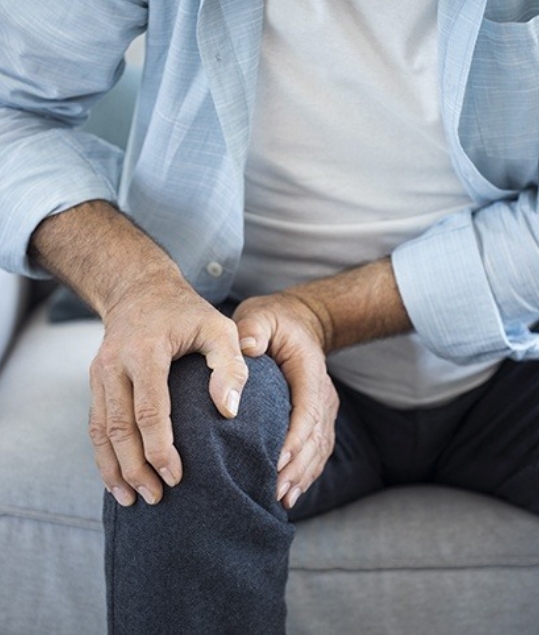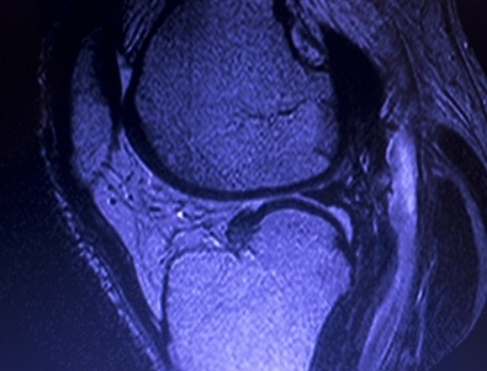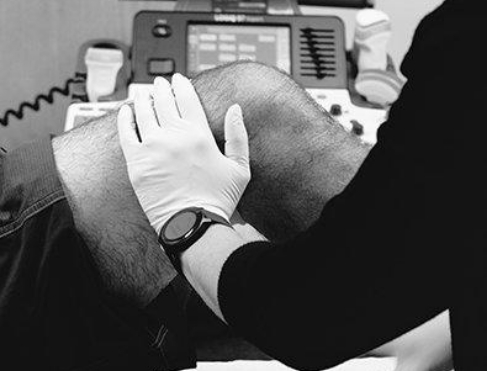Treating Meniscus Tears Glastonbury
Eliminating Knee Pain and Ensuring Future Relief

Knee pain is common and can develop from many causes, including a meniscus tear, which can occur after an injury or from the degenerative changes that come with age. Properly treating meniscus tears is essential in order to prevent or delay other knee conditions like arthritis. Dr. Paul Tortland at the New England Stem Cell Institute offers many treatments, including regenerative medicine, that can help repair and heal your meniscus tear. Contact our Glastonbury office to learn more about these innovative treatments.
What is a Meniscus Tear?

The meniscus is a set of matching C-shaped cartilage tissues in the knee joint that separates your femur (thigh bone) from your tibia (shin bone). Your knee has two menisci, one on the inner knee (medial meniscus) and one on the outer knee (lateral meniscus). They provide both cushion and stability for the joint. The medial meniscus is more commonly injured.
Meniscus tears are very common and can happen to anyone at any time. Particularly, athletes in sports that place a lot of stress on the knees, such as football, basketball, soccer, and other contact sports, are especially prone to meniscus tears. You can also develop a meniscus tear due to the degenerative changes that happen to the cartilage over time, leading to a thinning of the connective tissue that makes it more vulnerable to injury.
A meniscus tear increases your risk of developing arthritis in that knee. But with proper treatment, you might be able to delay the joint inflammation and slow or even prevent the development of arthritis.
What Symptoms Would I Experience from a Meniscus Tear?

You might feel a popping sensation during the initial injury to your meniscus, but you might be able to continue to walk or play your sport. Over the next few days following the injury, your knee may become stiff and painful, and even swollen. Other symptoms can include:
- A sense of joint instability
- Knee locking or catching
- Decreased or painful mobility
If you’re experiencing these symptoms, our team at the New England Stem Cell Institute can determine if your knee discomfort is the result of a meniscus tear after doing an MRI.
How is a Meniscus Tear Treated?

Treatment of your meniscus tear depends on the nature of the tear, your symptoms, and your age. Younger patients with an acute meniscus tear that causes instability usually need arthroscopic surgery to sew the tear. However, older patients with a degenerative meniscus tear often don’t require surgery. In fact, recent studies have shown that not only does arthroscopic surgery not help the symptoms of degenerative meniscal tears, but it may actually speed up the development of joint arthritis and increase the risk of needing a total joint replacement. Therefore, surgery for symptomatic degenerative meniscal tears typically is not recommended.
Our team at the New England Stem Cell Institute offers regenerative medicine treatments like stem cell injections as a nonsurgical alternative for patients with degenerative meniscus tears. When injected into your knee, the stem cells promote the generation of new, healthy tissue to repair your damaged cartilage.
If you have a meniscus tear, the specialists at the New England Stem Cell Institute recommend periodic injections of platelet-rich plasma (PRP), a blood-derived product that contains a concentrated amount of platelets, growth factors, and specialized cells, to delay or prevent the development of arthritis in your knee.
Meniscal Tears FAQs
Dr. Tortland and our team are ready to evaluate your case if you believe you require treatment for a torn meniscus. In the meantime, you might want to learn more about this type of injury and how it can be addressed. Below, you will find answers to some important FAQs. If your specific questions are not addressed here, please reach out to our office. We will be happy to talk with you.
Can a Torn Meniscus Heal on Its Own?
It is important to keep in mind that meniscal tears can vary greatly in their nature and severity. Some minor tears can heal on their own. In certain cases, very conservative methods, such as ice and reduced activity, can allow an injured meniscus to recover without professional medical intervention.
However, regardless of whether you believe your injury is minor or severe, you should visit a doctor. After a thorough evaluation, Dr. Tortland can recommend an approach to recovery that is tailored to your unique needs.
How Can I Prevent Meniscus Tears?
There is no guaranteed method for preventing meniscal tears. However, you may be able to reduce your risk via some precautionary measures:
- Strengthen your legs. Regular leg exercises can strengthen your knees and the surrounding structures.
- Do not overexert yourself. When you are starting a new sport or activity, be sure to properly warm up and avoid taking on more activity than your body can reasonably handle.
- Manage your weight. Being overweight or obese is associated with a higher risk of degenerative meniscal tears.
- Invest in good shoes. A good pair of shoes can do much to support your musculoskeletal health.
What Other Injuries Are Often Associated with a Torn Meniscus?
Meniscal tears do not always occur in isolation. In fact, they are often associated with injuries to the anterior cruciate ligament (ACL), as well as damage to other ligaments. Dr. Tortland can help to identify such injuries and recommend a comprehensive treatment plan.
Is It Safe to Walk with a Torn Meniscus?
Very often, it is possible to walk with a meniscal tear. However, doing so is not always safe. Continuing to place weight on an injured knee can lead to increased pain and swelling. If you have an acute meniscal tear, walking too much on it might actually increase your risk of developing osteoarthritis in the future. Knee injuries should never be ignored!
In some cases, light physical activity, including physical therapy, may be advisable to help strengthen the knee after a meniscal tear. Again, it is best to consult with a qualified physician to learn what the best course of action may be.
